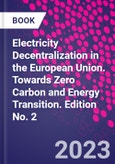Electricity Decentralization in the European Union: Towards Zero Carbon and Energy Transition, Second Edition examines progress in decentralization across the European Union, with each chapter focusing on developments and innovations in a specific country. Sections provide an overview of the current role and state of smart grids, the conceptualization of energy transition, and specific cases across all EU states. Across the chapters, regulatory frameworks are assessed to identify to what extent it is conducive to decentralization, with specific outcomes of decentralization covered in detail, including deployment of smart grids and meters, demand response, electric vehicles, and storage.
The book highlights how specific EU member states are progressing towards deployment of these tools and technologies, along with the specific needs and regulatory barriers in each and recommendations for how regulation can be more encouraging. In addition, electricity interconnections in the EU are considered as a vital step towards decentralization in order to boost energy security and energy efficiency. Finally, the book includes a detailed examination of data protection concerns that arise from the advent of new technologies that collect personal information, such as smart grids, assessing current regulation on data protection and identifying areas for improvement, as well as innovative finance options for sustainable energy.
Please Note: This is an On Demand product, delivery may take up to 11 working days after payment has been received.
Table of Contents
1. Smart grids in the European Union
2. Conceptualizing the energy transition in the European Union
3. Electricity decentralization and energy transition in Belgium
4. Electricity decentralization and energy transition in Greece
5. Electricity decentralization and energy transition in Spain
6. Electricity decentralization and energy transition in Italy
7. Electricity decentralization and energy transition in Bulgaria
8. Electricity decentralization and energy transition in Poland
9. Electricity decentralization and energy transition in France
10. Electricity decentralization and energy transition in Finland
11. Electricity decentralization and energy transition in Ireland
12. Electricity decentralization and energy transition in Estonia
13. Electricity decentralization and energy transition in Slovenia
14. Electricity decentralization and energy transition in Croatia
15. Electricity decentralization and energy transition in Austria
16. Electricity decentralization and energy transition in Luxembourg
17. Electricity decentralization and energy transition in Denmark
18. Electricity decentralization and energy transition in Sweden
19. Electricity decentralization and energy transition in Hungary
20. Electricity decentralization and energy transition in Cyprus
21. Electricity decentralization and energy transition in Lithuania
22. Electricity decentralization and energy transition in Romania
23. Electricity decentralization and energy transition in Malta
24. Electricity decentralization and energy transition in Slovakia
25. Electricity decentralization and energy transition in the Czech Republic
26. Electricity decentralization and energy transition in Latvia
27. Electricity decentralization and energy transition in Portugal
28. Electricity decentralization and energy transition in the United Kingdom
29. Innovative finance for sustainable energy








